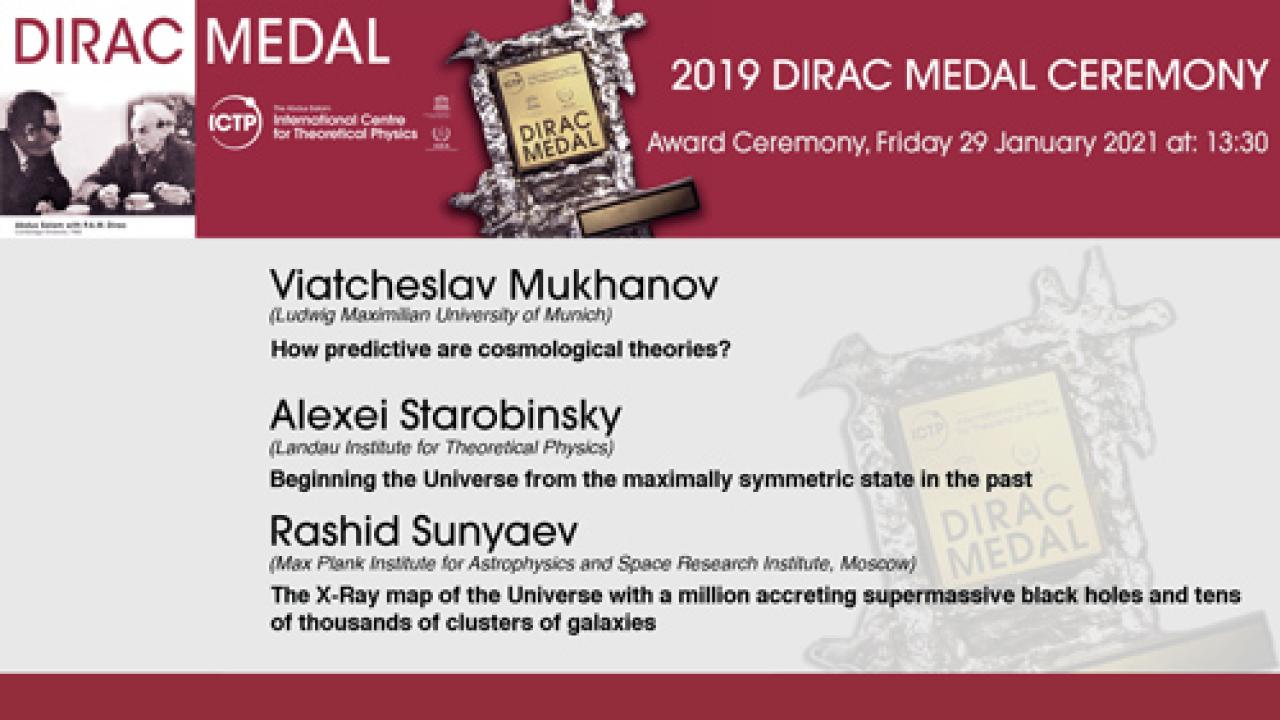
The 2019 Dirac Medal and Prize Ceremony, which was due to take place in May 2020, has been re-scheduled and re-designed to a virtual format due to the restrictions following the Covid-19 outbreak. On 29 January, starting at 13:30, the Ceremony will precede the third talk of the 2021 Salam Distinguished Lecture Series.
ICTP awarded its 2019 Dirac Medal and Prize to three physicists whose research has made a profound impact on modern cosmology. Viatcheslav Mukhanov (Ludwig Maximilian University of Munich), Alexei Starobinsky (Landau Institute for Theoretical Physics) and Rashid Sunyaev (Max Planck Institute for Astrophysics, and Space Research Institute, Moscow) shared the prize “for their outstanding contributions to the physics of the Cosmic Microwave Background (CMB) with experimentally tested implications that have helped to transform cosmology into a precision scientific discipline by combining microscopic physics with the large-scale structure of the Universe.” All three winners have made important contributions to the understanding of the early Universe in the context of inflationary cosmology.
More information on the three winners’ field of research can be found at: https://www.ictp.it/about-ictp/media-centre/news/2019/8/dirac-medal.aspx
The ceremony will include lectures (25 mins each) from the Dirac Medal winners, which are as follows:
- "How predictive are cosmological theories?" by Professor Viatcheslav Mukhanov.
- "Beginning the Universe from the maximally symmetric state in the past" by Professor Alexei A. Starobinsky.
- "The X-Ray map of the Universe with a million accreting supermassive black holes and tens of thousands of clusters of galaxies" by Professor Rashid Sunyaev.
More details on the ceremony and the lectures' abstracts are available at: http://indico.ictp.it/event/9518/
All are welcome to attend the events: advanced registration is required at this link. After registering, you will receive a confirmation email containing information about joining the webinar.The talks will also be livestreamed on ICTP's YouTube channel.
About the Medallists
Viatcheslav Mukhanov is generally known for the theory of the quantum origin of the Universe’s structure. While working in the Lebedev Physical Institute in Moscow, Mukhanov, in collaboration with Gennady Chibisov, discovered in 1981 the mechanism for the generation of scalar perturbations of the space-time metric in a model of cosmological inflation initially proposed by Starobinsky. Numerous experiments measuring the temperature fluctuations of the CMB confirmed his theoretical prediction that galaxies and galaxy clusters stem from initial quantum fluctuations. In 1985 he further developed a rigorous formalism to describe density perturbations in many inflationary models.
Alexei Starobinsky is considered, together with Alan Guth and Andrei Linde, a pioneer and leading developer of the theory of cosmic inflation. In 1979 he predicted that gravity waves should follow from what was later to be called inflation. Starobinsky later proposed a specific version of cosmological inflation, which is still the most perfectly consistent with experiments. He wrote one of the first articles to compute density perturbations in one of the most promising models of inflation, called “slow-roll inflation,” and developed the formalism of “stochastic” inflation, a model of inflation that is not as idealized as the previous ones.
Rashid Sunyaev has made ground-breaking contributions to the fields of physical cosmology and high-energy astrophysics. In 1970 he predicted, together with Yakov Zeldovich, the existence of acoustic peaks in the CMB. These can be seen as the elements of a pattern in the CMB sky that show how it is not uniform. They predicted the decrease in brightness of the CMB in the direction of rich clusters of galaxies, which is now known as the Sunyaev-Zeldovich effect. This discovery makes it possible to use clusters of galaxies as a powerful tool of observational cosmology. It is indeed the best tool we have now to measure the abundance and motion of distant clusters of galaxies.
About the ICTP Dirac Medal
First awarded in 1985, ICTP's Dirac Medal is given in honour of P.A.M. Dirac, one of the greatest physicists of the 20th century and a staunch friend of the Centre. It is awarded every year on Dirac's birthday, 8 August, to scientists who have made significant contributions to theoretical physics. For more details about the prize and a list of past winners, see: https://www.ictp.it/about-ictp/prizes-awards/the-dirac-medal.aspx.
















